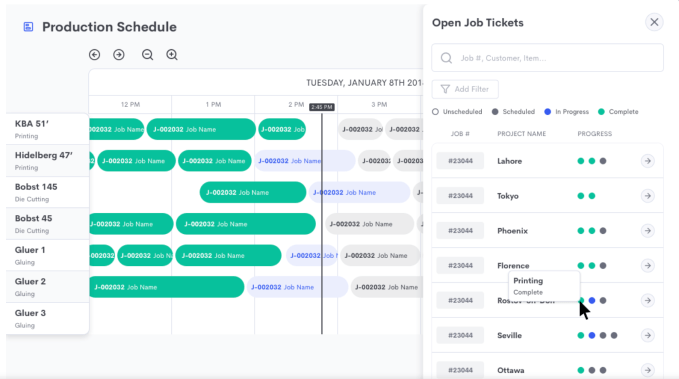Startups
WorkClout brings SaaS to factory floor to increase operational efficiency


Factory software tools are often out of reach of small manufacturers, forcing them to operate with inefficient manual systems. WorkClout, a member of the Y Combinator Winter 2019 class, wants to change that by offering a more affordable SaaS alternative to traditional manufacturing software solutions.
Company co-founder and CEO Arjun Patel grew up helping out in his Dad’s factory and he saw first-hand how difficult it is for small factory owners to automate. He says that traditional floor management tools are expensive and challenging to implement.
“What motivated me is that when my Dad was trying to implement a similar system,” Patel said. He said that his father’s system had cost over $240K, taken over a year to get going and wasn’t really doing what he wanted it to do. That’s when he decided to help.
He teamed up with Bryan Trang, who became the CPO and Richard Girges, who became the CTO to build the system that his Dad (and others in a similar situation) needed. Specifically, the company developed a cloud software solution that helps manufacturers increase their operational efficiency. “Two things that we do really well is track every action on the factory floor and use that data to make suggestions on how to increase efficiency. We also determine how much work can be done in a given time period, taking finite resources into consideration,” Patel explained.
He said that one of the main problems that small-to-medium sized manufacturers face is a lack of visibility into their businesses. WorkClout looks at orders, activities, labor and resources to determine the best course of action to a complete an order in the most cost-effective way.
“WorkClout gives our customers a better way to allocate resources and greater visibility of what’s actually happening on the factory floor. The more data that they have, the more accurate picture they have of what’s going on,” Patel said.

Production Schedule view. Screenshot: WorkClout
The company is still working on the pricing model, but today it charges administrative users like plant management, accounting and sales. Machine operators get access to the data for free. The current rate for paid users starts at $99 per user per month. There is an additional one-time charge for implementation and training.
As for the Y Combinator experience, Patel says that it has helped him focus on what’s important. “It really makes you hone in on building the product and getting customers, then making sure those two things are leading to customer happiness,” he said.
While the company does have to help customers get going today, the goal is to make the product more self-serve over time as they begin to understand the different verticals they are developing solutions for. The startup launched in December and already has 13 customers, generating $100,000 in annual recurring revenue (ARR), according to Patel.
-

 Entertainment6 days ago
Entertainment6 days ago‘Presence’s Steven Soderbergh and David Koepp on ghosts, horror, and hating winks
-

 Entertainment7 days ago
Entertainment7 days agoWhat are immigration red cards? How the internet is rallying behind undocumented workers
-

 Entertainment6 days ago
Entertainment6 days ago‘Pee-wee as Himself’ review: Paul Reubens’ documentary is a must-see for ‘Playhouse’ fans
-

 Entertainment6 days ago
Entertainment6 days agoTikTok ban: Influencers brace for an uncertain future
-

 Entertainment5 days ago
Entertainment5 days agoFilms by Black creators to watch on Netflix
-

 Entertainment3 days ago
Entertainment3 days ago‘Dimension 20’s ‘Gauntlet at the Garden’ was a euphoric experience for ‘Dungeons and Dragons’ fans everywhere
-

 Entertainment6 days ago
Entertainment6 days agoHow to stop doomscrolling with apps you already have
-

 Entertainment3 days ago
Entertainment3 days ago‘If I Had Legs, I’d Kick You’ review: Rose Byrne stuns in nauseating thrill ride about motherhood






















